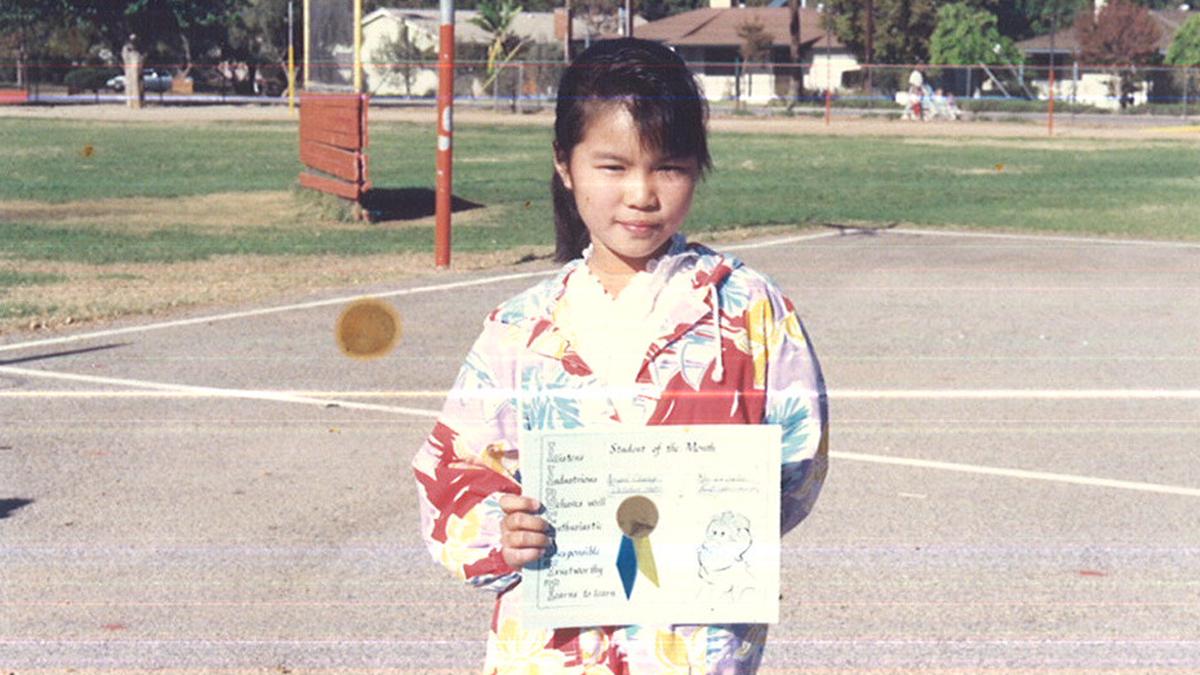Angel Ryono, was student of the month at an elementary school in California.
Angel Ryono has lived in the US as a legal permanent resident for more than a decade. She’s studied here, married an American, and has no intention of moving back to her homeland of Taiwan.
(Editor's Note: This story is part of a series all week on PRI's The World about citizenship. There will also be an online discussion about citizenship and its place in the immigration reform debate on PRI.org on Thursday.)
"I am, for the most part, more American than I am Taiwanese, Chinese at this point," Ryono said.
Still, when it’s comes to taking the next step and becoming a US citizen, she's been on the fence.
"There was one point when I actually considered never getting my citizenship, when George W. Bush was in office, but nowadays I feel much more inclined to apply for my citizenship," she said.
Leaning toward citizenship — but still undecided.
Full disclosure: I know Angel Ryono from high school, when her name was Angel Chang. She was one of the smart kids; she applied for early admission to Smith College. And she was political, hanging out with the kids sporting lefty buttons and Che T-shirts. But what I didn't know about Angel was that she was undocumented.
Turns out, she didn't really know herself — until she was 17 and told her parents she’d just received a full ride to Smith.
"I wasn't expecting them to have a disturbed look on their face and that's when they told me that I couldn't go to Smith, I didn't have documents," Ryono said. "I would have to pay full tuition without aid. There's no way I could go."
That moment, at 17, changed her life. Angel didn't go to Smith. Instead, at 18, she married her high school sweetheart and began the process to get a green card of her own.
"I filed all by myself, no lawyer, no help, and waited in line, went to all the meetings, attended the interviews — it was all me," Ryono said.
The process left a bitter taste in her mouth. Angel is far from alone, says Joanne Gottesman, a professor of immigration law at Rutgers University in Camden.
"There is a little bit of fear of the immigration process because these people have gone through it to get their green card [and] they realize how daunting the paperwork is," Gottesman said.
The paperwork can be intimidating, beginning with the N400 form. It helps determine whether applicants meet one of the requirements to become a citizen: good moral character.
So how do you judge moral character?
According to Randi Chmielewski who coordinates Citizenship Rutgers, a free service in New Jersey that helps immigrants fill out the N400, the questions can be rather bizarre.
"It's asking everything from have you ever had a parking ticket, to have you ever been a prostitute?" Chmielewski said.
Been a member of the Communist Party? Or aligned with the Nazi regime in Germany? Been a habitual drunkard? Yes, that’s all on the form. Still, even after helping many people fill out the form, place it in an envelope and put on a stamp, Gottesman says she found people didn't drop it in the mail. They didn't naturalize.
"They simply weren’t filing because they couldn’t afford the cost," Gottesman said.
The cost is rather high, $680 just to file the form. That’s about two weeks of minimum wage work in many states. And that doesn't include any lawyer fees, either.
For Angel, the fees, or ticking a box about her political affiliations, isn’t really what’s keeping her from applying for citizenship. No, her reluctance is pegged to her prior experience navigating the immigration system and it all leads back to one single day nearly a decade ago. She was waiting in yet another line to get her green card and she watched as a family standing next to her was told to go back home.
"The staff person explained to them, 'we lost your file. You have to file all the papers over again.' And I keep thinking back to that family," Ryono said. "I can't imagine if I have to move and request for a transfer of files and they just lose it and I'll have to start all over again — that alone is a big deterrent; it's very emotional.
An emotional, expensive, bureaucratic nightmare yet, still, Angel says, she will get around to it. Just when the timing feels right.
We’d love to hear your thoughts on The World. Please take our 5-min. survey.
